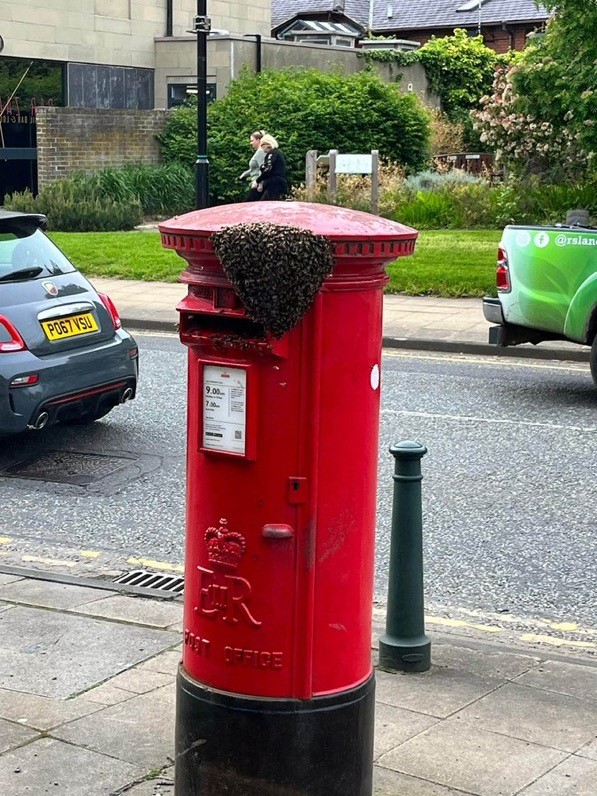Swarming is a natural honeybee process. It is the colony reproducing with the queen leaving with around 50% of the bees. They leave their hive and find somewhere to hang in a cluster until the scout bees decide on their new home.
Most swarms occur on warm sunny days from May to the end of July, usually between 11am – 4pm. Often there is a peak on a fine day after poor weather when temperatures approach the high teens.
A noisy honeybee swarm can be extremely dramatic involving many thousands of bees in a large noisy cloud. However, they normally settle into a cluster within 15 minutes.
If you think you’ve got a honeybee swarm please call our swarm coordinator Charles Bishop on 07368269491 to arrange removal.
When calling, be prepared to answer questions about the swarm:
- Description of what you have seen or ideally send a photo
- Size of cluster/how many (e.g. football size etc.)?
- (Honey bee swarms are thousands not a dozen or so)
- Location/access (indoors, outdoors, chimney, etc)?
- Height (e.g. 1st floor, roof top)?
- How long have they been there?
- Have you called anyone else?
- Address/directions/parking including postcode?
- Contact number?
Please inform the beekeeper if the swarm leaves before they arrive or if someone else collects it to save a wasted journey.
Do not give multiple beekeepers the details once one has agreed to attend.
Other useful information:
Collecting a swarm is normally a 2 part process:
1. To get the bees into a box or skep. See Video
2. To return in the evening to remove bees and box.
- Some beekeepers may ask for expenses but we don’t.
- If on arrival the beekeeper finds that it is not honeybees then we are unlikely to be able to help.
- Most honeybee swarms are not aggressive but please do keep away and leave them alone.
- Honeybee swarming is natural and the bees are just looking for a new home.
- Bumblebees are best left alone. They are valuable pollinators, some are endangered. Don’t try to block entrance holes as they will try to find another way out possibly into the property. They will die out naturally in late summer/autumn, therefore the cost of a pest controller is easily avoided.
- Please don’t use chemicals or other products on them.
- Wasps may require a pest controller if in a dangerous position. Wasps are also good pollinators and eat pests in your garden. Beekeepers don’t remove wasps.
- Swarm collection is carried out by volunteer beekeepers at their own discretion and are not paid to provide this service.
- Swarming bees usually don’t sting but it is wise to stay away from the swarm and keep children & pets indoors.
- The beekeeper may not be able to come immediately; they may have jobs and commitments of their own.
- Beekeepers have to consider their own safety; it may not be possible to remove a swarm from difficult to reach places. Our beekeepers are covered by public liability insurance.


Sometimes the swarm really stands out…..and sometimes not!
An early swarm for member Frances Lord appeared in her garden on 20th April’24, see video.
